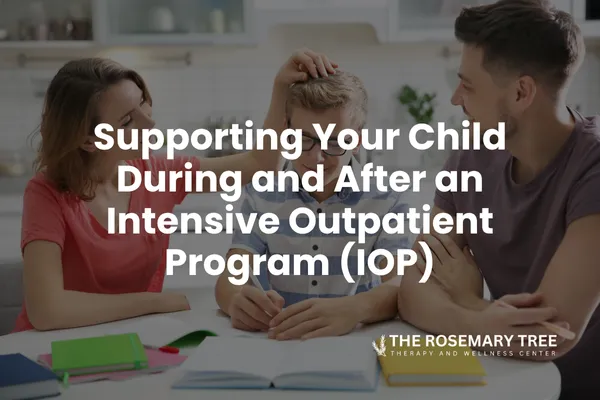
Supporting Your Child During and After an Intensive Outpatient Program (IOP)
Introduction: The Journey Doesn’t End When Sessions Do
Watching your child enter an Intensive Outpatient Program (IOP) can feel both hopeful and nerve-wracking. While the structured environment provides a powerful foundation, your involvement is crucial for lasting progress. Here’s how to support your teen throughout the program and long after it concludes.
Stay Engaged During Treatment
Active parent participation enhances the effectiveness of adolescent IOPs. Attend the scheduled family or parent sessions—often held weekly—to learn the skills your teen is practicing. Ask questions, take notes, and practice these strategies at home. Use progress updates from therapists to spark meaningful conversations with your child and reinforce accountability. Your consistent presence communicates that you’re invested in their journey.
Encourage Skill Practice at Home
IOPs teach practical tools for emotion regulation, stress management, and healthy communication. Help your teen integrate these skills into everyday life. If they’re learning mindfulness techniques, set aside time for family breathing exercises. Role-play challenging situations—like handling conflicts with friends or managing school stress—to reinforce coping strategies. Consistent practice outside therapy deepens learning and builds confidence.
Foster Connection and Community
Isolation can undermine progress, so encourage positive social interactions. Support your teen in maintaining friendships, attending supportive peer groups, or joining extracurricular activities they enjoy. After the program, consider group-based aftercare—such as a teen DBT group—where your child can continue honing skills alongside peers. Shared experiences create a sense of belonging and reduce the risk of relapse.
Monitor and Celebrate Progress
Recovery isn’t linear. Pay attention to shifts in mood, behavior, and communication patterns. Celebrate small victories—like using a coping skill, engaging in family time, or making a new friend. Positive reinforcement motivates your teen to keep going. If you notice setbacks or renewed struggles, reach out to the clinical team promptly for guidance.
Plan for Aftercare Early
As the program nears completion, collaborate with the treatment team on a discharge plan tailored to your child’s needs. Many adolescents benefit from continuing therapy—either individually or as a family—to maintain momentum. Discuss whether a teen DBT group or other specialized programs would be beneficial. Knowing what comes next reduces uncertainty and provides a clear path forward.
Support the Transition Back to Daily Life
Returning to school and regular routines can be challenging. Work with educators to ensure accommodations are in place, if needed. Help your teen organize their schedule to balance academics, activities, and self-care. Encourage gradual exposure to stressors—like larger social gatherings or challenging classes—while reinforcing the skills learned during the program.
Practice Self‑Care as a Parent
Supporting a child through intensive treatment can be emotionally draining. Prioritize your own mental health so you have the capacity to support theirs. Attend parent support groups, seek individual counseling, or engage in self-care activities that recharge you. A healthier you strengthens your family system and models positive coping for your teen.
Keep Lines of Communication Open
Maintain honest, judgment-free communication with your child. Ask open-ended questions about how they’re feeling and what challenges they’re facing. Listen more than you speak, and validate their experiences. Encourage them to share what helps and what doesn’t, and be willing to adjust your support accordingly. Trust and transparency foster resilience and deepen your bond.
Conclusion: A Continuing Partnership
An Intensive Outpatient Program provides your teen with tools, insight, and support—but lasting growth depends on what happens outside therapy, too. By staying engaged, practicing skills, fostering community, and prioritizing both your teen’s and your own well-being, you create an environment where healing can take root and flourish. Your partnership with your child and their therapists is the key to turning treatment gains into lifelong resilience.


